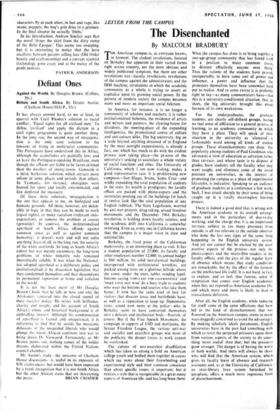Defiant Ones
Britain and South Africa. By Dennis Austin. (Chatham House/O.U.P., 35s.) IT has always seemed hard, to me at least, to quarrel with Cecil Rhodes's solution to racial conflict : 'Equal rights for all civilised men.' To define 'civilised' and apply the dictum in a civil rights programme is quite another thing. In the long run, the second way of miscegena- tion is the only sane solution to the tensions of living in multiracial communities. The Portuguese have understood this in Africa, although the assimilados are painfully few; and so have the Portuguese-speaking Brazilians, even though the affluent are liable to be fairer-skinned than the dwellers of shanty-towns. Genocide is a third, barbarous solution, which attracts more odium in some places and periods than others. In Tasmania, for instance, aborigines were hunted for sport and totally exterminated, and few deplored the massacre.
Of these three solutions, miscegenation is the one that appeals to me, on biological and humane grounds. All three, however, are defen- sible in logic in that they can be made to work (equal rights), or make racialism irrelevant (mis- cegenation), or remove the problem at source (genocide). In contrast, the institutionalised apartheid of South Africa offends against common sense as well as against common humanity: it doesn't work and will not solve anything, least of all, in the long run, the security of the white overlords. So long as South Africa's colour bar was merely customary, the long-term problems of white minority rule remained theoretically soluble. It was when the National- ists adopted apartheid as a deliberate policy and institutionalised it by draconian legislation that they condemned themselves and their descendants to permanent repression at home and isolation in the world.
It is not the least merit of Mr Douglas Brown's book that he tells us how and why the Afrikaners ventured into the closed tunnel of their racialist policy. He writes with brilliance, charity and insight. and his account of South Africa's ethnic and historical background is of enthralling interest. Although his condemnation of apartheid is factual and unequivocal, it is refreshing to find that he avoids the messianic delusions of the misguided liberals who would plunge the whole African continent into war to bring down Dr Verwoerd. Fortunately, as Mr Brown points out, nothing comes of the wilder dreams elaborated within the United Nations council chambers.
Mr Austin's study—the outcome of Chatham Howse discussions--is useful in its exposure of uk irrelevancies, but would have been improved by a frank recognition that it is not South Africa but the other African states that are threatening






























 Previous page
Previous page